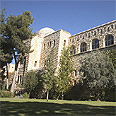
ADL slams British union's call for academic boycott of Israel
'Cynical and perverse violation of academic freedom,' Anti-Defamation Leauge describes Britain's University and College Union's motion to allow reintroduction of boycott despite legal advice stating it would be in breach of British anti-discrimination laws
LONDON - The University and College Union (UCU), the largest trade union and professional for academics and lecturers working throughout the UK, called on its members Wednesday to "consider the moral and political implications of educational links with Israeli institutions, and to discuss the occupation with individuals and institutions concerned, including Israeli colleagues with whom they are collaborating."
The Anti-Defamation League (ADL) denounced the vote, calling it a “cynical and perverse violation of academic freedom and anti-discrimination principles."
ADL National Director Abraham Foxman issued a statement saying: "Four years after the first such academic boycott resolution, it is clear the UCU’s anti-Israel activists remain as determined as ever to demonize everything and everyone Israeli, while shunning constructive measures to promote Israeli-Palestinian academic partnerships."
The motion, which was passed at the UCU's annual congress in Manchester, noted the "continuation of the illegal settlement eneterprise, killing of civilians and the humanitarian catastrophe imposed on Gaza by Israel and the EU'.
If UCU were to implement the motion, it would encourage its 160,000 members to consider cutting off links with Israeli academic institutions - most of these links are with individual Israeli academics such as research partnerships, peer review of papers, or academic conferences.
Philosophy Professor Tom Hickey, who headed the initiative, said Wednesday that the call was not to boycott Israeli academies altogether, but rather for the lecturers to reevaluate their ties with Israeli institutions, given the situation in Gaza.
The matter, he said, was in the early stages of discussion. The UCU still has to conduct serious discussion prior to any decision on an overall academic embargo.
'Boycott never the right answer'
Jeremy Newmark, joint head of the "Stop the Boycott" campaign said, “UCU has again demonstrated how out of touch the it is with the vast majority of its membership and with the wider academic community. This motion does nothing to help the Palestinians.
“Trade Unions exist to defend their members in the workplace. Our legal opinion, produced at the request of UCU members, shows that this motion promotes discrimination," he said, "it runs counter to all that a trade union should stand for, discriminating against some of its members instead of defending all of them."
Lorna Fitzsimons, also of the "Stop the Boycott" campaign, added that “boycotts of any kind do nothing to promote peace and moderation in the Middle East, as well as undermining the academic freedom and integrity of British academic institutions.
“A boycott has never been the right answer for those looking to genuinely help Palestinians and Israelis. The way forward must be to build bridges, encourage dialogue and allow ordinary Israelis and Palestinians the opportunity to engage with each other," she said.
The British Foreign Office spokesperson responded to the motion by saying that the British government "fully supports academic freedom and is firmly against any academic boycotts of Israel, Israeli universities or academics," but added that "the motion passed does not impose a boycott on Israel."
Israeli Ambassador to the UK Ron Prosor said in response that "the reoccurring calls for an academic boycott on Israel over the past few years are another attempt to delegitimize Israel both in Academia and the professional British associations.
"The elements pushing for this boycott are only out to defame Israel at all costs. The Israeli embassy is in the forefront of the fights against this phenomenon and is working closely with our friends and allies in Britain to eradicate this boycott."















